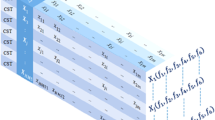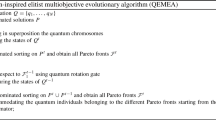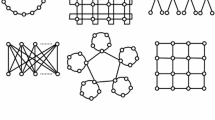Abstract
As an important multi-objective optimization algorithm, multi-objective evolutionary algorithm based on decomposition (MOEA/D) attracts more and more attention recently. In this paper, some methods inspired from quantum behavior are integrated in MOEA/D. A new algorithm, quantum-inspired MOEA/D (QMOEA/D), is proposed and proved to be effective to improve the performance of MOEA/D. In the new algorithm, a global solution (GS) and a local solution (LS) are stored for each subproblem. The attractor and characteristic length in quantum-inspired method are designed with GS and LS. The LS is selected as the attractor for each subproblem. And the characteristic length is associated with the difference between the LS and GS. The algorithm based on nondominated sorting is used for comparing firstly. Then the original and some advanced versions of MOEA/D are used as the comparison algorithms. Through the comparison it can be found that GS and LS are helpful to retain the diversity of the solutions. A wide Pareto front can be obtained on most of the test suites. And the quantum-inspired generator is effective to obtain better solutions with GS and LS.










Similar content being viewed by others
References
Abs da Cruz AV, Barbosa CRH, Pacheco MAC, Vellasco MBR (2004) Quantum-inspired evolutionary algorithms and its application to numerical optimization problems. Lecture notes in computer science, pp 212–217
Deb K, Pratap A, Agarwal S, Meyarivan T (2002) A fast and elitist multiobjective genetic algorithm: NSGA-II. IEEE Trans Evol Comput 6(2):182–197
Elhossini A, Areibi S, Dony R (2010) Strength Pareto particle swarm optimization and hybrid EA-PSO formulti-objective optimization. Evol Comput 18(1):127–156
García S, Fernández A, Luengo J et al (2009) A study of statistical techniques and performance measures for genetics-based machine learning: accuracy and interpretability[J]. Soft Comput 13(2):959–977
Han K-H, Kim J-H (2002) Quantum-inspired evolutionary algorithm for a class of combinatorial optimization. IEEE Trans Evol Comput 6:580–593
Ishibuchi H, Nojima Y (2011) Performance evaluation of evolutionary multiobjective optimization algorithms for multiobjective fuzzy genetics-based machine learning. Soft Comput 15(12):2415–2434
Jiao L, Li Y, Gong M, Zhang X (2008) Quantum-inspired immune clonal algorithm for global numerical optimization. IEEE Trans Syst Man Cybern Part B Cybern 38(5):1234–1253
Jixang C, Gexiang Z, Zhidan L, Yuquan L (2012) Multi-objective ant colony optimization based on decomposition for bi-objective traveling salesman problems. Soft Comput 16(4):597–614
Li H, Zhang Q (2009) Multiobjective optimization problems with complicated Pareto sets. MOEA/D and NSGA-II. IEEE Trans Evol Comput 13(2):284–302
Li H, Landa-Silva D (2011) An adaptive evolutionary multi-objective approach based on simulated annealing. Evol Comput 19(4):561–595
Li Y, Xiang R, Jiao L, L Ruochen (2012) An improved cooperative quantum-behaved particle swarm optimization. Soft Comput 16(6):1061–1069
Liu HL, Gu F, Zhang Q (2014) Decomposition of a multiobjective optimization problem into a number of simple multiobjective subproblems[J]. IEEE Trans Evol Comput 18(3):450–455
Marler RT, Arora JS (2004) Survey of multi-objective optimization methods for engineering. Struct Multidiscipl Optim 26(6):369–395
Montaño AA, Coello Coello CA, Mezura-Montes E (2010) MODE-LD+SS: a novel differential evolution algorithm incorporating local dominance and scalar selection mechanisms for multi-objective optimization. In: 2010 IEEE Congress on evolutionary computation (CEC’2010), Barcelona, Spain, July 18–23. IEEE Press, pp 3284–3291
Narayanan A, Moore M (1996) Quantum-inspired genetic algorithms. In: Proceedings of the 1996 IEEE international conference on evolutionary computation. IEEE Press, Piscataway, pp 61–66
Sierra MR, Coello Coello CA (2005) A study of fitness inheritance and approximation techniques for multi-objective particle swarm optimization. In: Proceedings of Congress on evolutionary computation (CEC 2005), Edinburgh, UK, pp 65–72
Sindhya K, Ruuska S, Haanp T, Miettinen K (2011) A new hybrid mutation operator for multiobjective optimization with differential evolution. Soft Comput 15(2):2041–2055
Sun J et al (2004) Particle swarm optimization with particles having quantum behavior. In: Proceedings of 2004 Congress on evolutionary computation, pp 325–331
Sun J, Fang W, Wu X, Palade V, Xu W (2012) Quantum-behaved particle swarm optimization: analysis of the individual particle’s behavior and parameter selection. Evol Comput 20(3):349–393
Zapotecas Martínez S, Coello Coello CA (2011) A multi-objective particle swarm optimizer based on decomposition. In: Proceedings of the 13th annual genetic and evolutionary computation conference (GECCO’2011), Dublin, Ireland, July 2011. ACM, pp 69–76
Zhang Q, Li H (2007) MOEA/D: a multiobjective evolutionary algorithm based on decomposition. IEEE Trans Evol Comput 11(6):712–731
Zhang Q, Zhou A, Jin Y (2008) RM-MEDA: a regularity model-based multiobjective estimation of distribution algorithm. IEEE Trans Evol Comput 12(1):41–63
Zhang Q, Liu W, Tsang E, Virginas B (2010) Expensive multiobjective optimization by MOEA/D with Gaussian process model. IEEE Trans Evol Comput 14(3):456–474
Zhang Q, Liu W, Li H (2009) The performance of a new version of MOEA/D on CEC09 unconstrained MOP test instances, Tech. Rep. CES-491, The School of Computer Science and Electronic Engineering, University of Essex
Zitzler E, Deb K, Thiele L (2000) Comparison of multiobjective evolutionary algorithms: empirical results. Evol Comput 8(2):173–195
Zitzler E, Laumanns M, Thiele L (2002) SPEA2: improving the strength Pareto evolutionary algorithm for multiobjective optimization. In: Evolutionary methods for design optimisation and control, pp 95–100
Acknowledgments
This work was supported by the Cheung Kong Scholars Program of China (Grant No. K5051302050), the Program for New Century Excellent Talents in University (No. NCET-12-0920), the Program for New Scientific and Technological Star of Shaanxi Province (No. 2014KJXX-45), the National Natural Science Foundation of China (Nos. 61272279, 61272282, 61001202 and 61203303), the Fundamental Research Funds for the Central Universities (Nos. K5051302049, K5051302023, K50511020011, K5051302002 and K5051302028), the Provincial Natural Science Foundation of Shaanxi of China (No. 2011JQ8020), the Fund for Foreign Scholars in University Research and Teaching Programs (the 111 Project) (No. B07048) and EU IRSES project (No. 247619).
Author information
Authors and Affiliations
Corresponding author
Additional information
Communicated by V. Loia.
Rights and permissions
About this article
Cite this article
Wang, Y., Li, Y. & Jiao, L. Quantum-inspired multi-objective optimization evolutionary algorithm based on decomposition. Soft Comput 20, 3257–3272 (2016). https://doi.org/10.1007/s00500-015-1702-9
Published:
Issue Date:
DOI: https://doi.org/10.1007/s00500-015-1702-9




